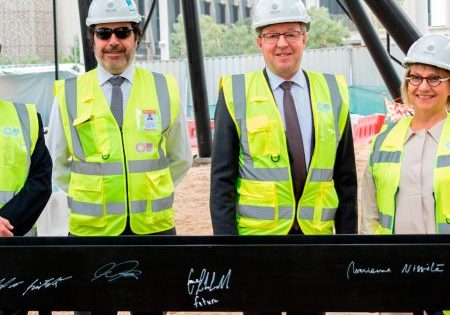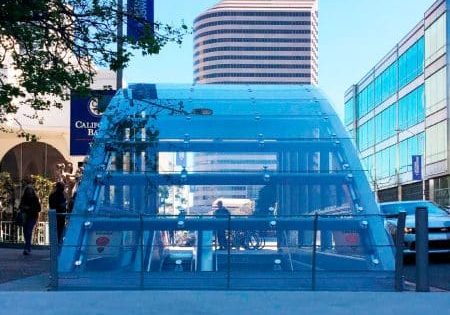Today’s tech-savvy elevator users are accustomed to the type of content in-car displays can deliver.
by Alice Gogh
It’s 8 a.m. on a Monday, and you’ve just survived the harrowing rush hour commute. Upon arriving at your building, you step into the safety of a quiet, marble-lined, gold-toned lobby to press the stainless-steel push button, emblazoned with an upward triangle. As a soft ding invites you to the opening doors, you step into an immaculately detailed cab, filled with custom-fabricated brushed bronze finishes and austere paneling, illuminated with tastefully recessed lighting. You are the rider, the most valuable asset to an owner or an operator, and all of this was done for you. Yet, throughout the entire course of the ride, your objective is singular and focused: to stare at a single, random spot in the corner and avoid engagement with co-occupants at all costs.
Today’s elevator is safer, faster and more advanced than ever. With all the painstaking diligence and technical rigor that goes into driving these advancements, one of the most noticeable transformations to the elevator environment emerged natively — the riders themselves. And, to reach this highly valuable audience in a moment when they are seemingly the most disengaged takes an acute understanding of who they are.
The Tech-Fluent Rider
The digitization of the elevator environment has resulted in more-reliable equipment, predictive maintenance and faster speeds with rider predictability. The theme of digitization extends beyond the physical cab itself into one of the most dramatically digitized elements of an elevator experience: the person within the elevator.
Today’s rider is sophisticated and tech-savvy. Driven by an always-connected culture, the modern professional is tech-fluent, whether as a digital native or a digital immigrant. While digital fluency is often scrutinized for its professional or career impacts, the effects can be more fundamental and nascent at all levels of engagement. According to a 2008 study by the University of California at Los Angeles Semel Institute for Neuroscience and Human Behavior,[1] researchers have found that “digital natives’ brains are hardwired differently, since they were exposed to different digital products early,” engaging more actively with webpages than with the printed word. As such, the rider values flexibility, accessibility and usefulness, seeded in socially conscious and individualist mindsets. Trained by personalized Rich Site Summary feeds, customized content channels and user-loaded preferences, the rider’s expectation is to have relevant and timely digital content delivered on a regular basis.
From an operator’s perspective, this evolution translates into individuals who expect their digital surroundings to reach out to them and inform them about matters relevant to them. As self-absorbed as that may sound, this mindset actually results in more opportunities for operators to engage and, more importantly, delight tech-fluent riders.
Messages That Matter
The riders’ expectations of their environments have resulted in the commercial real estate (CRE) industry scrambling to cater to this valuable — and rather particular — audience. Operators are investing in digital assets at their property, from digital wall speculators to app-based tenant communities. According to Deloitte Insights’ “2020 Commercial Real Estate Outlook,”[2] 92% of surveyed CRE executives plan to maintain or increase their tenant experience-related technology investments. Inside the elevator, these tenant-centric investments manifest as digital signage. However, the success (return on investment) for tech investments can be realized only if the digital assets deliver what the rider is accustomed to — tailored and engaging content.
While the analog components of digital signage are important, such as the faceplate or size of the display, the greatest impression on the rider is conveyed through the message itself. As demonstrated in the plethora of social media apps, digital natives turn to their digital channels to seek a sense of community and to stay informed throughout the day. Elevator digital media is not immune. Office digital media company Captivate has found that 60% of tenants believe elevator screens help build a sense of community inside the building, and 39% of riders rely on the elevator screens to get news during office hours.[3]
Ensuring that content is relevant and actionable is not a passive activity. Unlike mobile devices, the rider cannot directly influence and modify the content on the screen, so the onus falls on operators to ensure viewer satisfaction. Among the most effective content items that can be delivered through an elevator display is building information — notably, communication regarding upcoming events, sustainability initiatives or even onsite amenities. According to Captivate’s Tenant Satisfaction survey,[3] 95% of tenants believe elevator screens are an effective way to communicate building information. In order to remain relevant and refreshed on a regular basis, this requires a simple, easy-to-administer content management system for operators.
However, relying on operators alone is often cumbersome, and digital media can easily become stale. To prevent that and ensure that the rider maintains a positive and actionable interaction with the digital displays, other news and information must be a part of the content strategy. Captivate, for example, employs a team of editors who hand-curate each story that appears on the network, relying on both first-party and third-party verified research to ensure the content is compelling. Captivate’s survey of North American property managers found that 88% of property managers believe Captivate is an attractive building amenity for millennial workers, reinforcing the value of curated digital media to a tech-fluent audience. Incorporating a content partner that delivers viewer-reviewed and research-validated media is imperative for ensuring the news and information is appropriate for the fastidious tenant audience. As the saying goes, “content is king.”
Conclusion
Through innovations in technology and delivery, the digital format allows for constant reinvention of content and customization. Aided by increased connectivity, including the advent of 5G, the digital medium is now foundational as the preferred channel of communication for today’s elevator rider. Optimizing this channel to deliver actionable and relevant messages delivers the highest value back to the operators.
There are hundreds of touchpoints, details and decisions that go into the elevator experience, from handrails, to door trajectory, to other highly scientific nuances. Yet, despite all the meticulousness, the everyday elevator rider often only subconsciously engages with these elements, most often when there’s an issue. Capturing and delighting today’s tech-fluent rider is achieved most directly through contextual, relevant and engaging digital content.
References
[1] www.semel.ucla.edu/longevity/news/mind-what-sciencesays-
about-digital-natives
[2] www2.deloitte.com/us/en/insights/industry/financialservices/
commercial-real-estate-outlook.html
[3] Captivate North American Tenant Satisfaction Survey (2017).
Get more of Elevator World. Sign up for our free e-newsletter.










